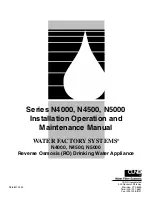
—
3
—
Safety Instruction
Warning
●
Turn off the power supply.
Working without disconnecting the power supply may
cause an electrical shock. Before engaging upon any
working procedures involving the pump, make sure to turn
the power supply switch off and to stop the pump and
other related devices.
●
Terminate operation!
When you detect or become aware of a dangerous sign or
abnormal condition during operation, terminate the
operation immediately and start it from the beginning
again.
●
For specified application only.
The use of a pump in an application other than those
clearly specified may result in injury or damage to the
pump. Use the pump strictly in accordance with the pump
specifications and application range.
●
No remodeling!
Never remodel a pump. Otherwise, a serious accident
may result. Iwaki will not be responsible for any accident
or damage of any kind which is caused by the user
remodeling the pump without first obtaining permission or
instructions from Iwaki.
●
Wear protectors.
If you touch or come in contact with any type of
hazardous chemical liquid, including but not limited to
chemicals, you may experience a serious injury. Wear
protective gear (protective mask, gloves, etc.) during the
pump operation.
Caution
●
Damaged pump
Never operate a damaged pump. A damaged pump may
cause leakage or electrical shock.
●
Operating site must be free of water and
humidity
The pump is not designed to be water-proof or dust-proof.
The use of the pump in places where water splashes or
humidity is high may result in an electrical shock or short
circuit.
●
Do not damage or change power cable!
Do not scratch, damage, process, or pull the power cable
forcibly. An extra load onto the cable, such as heating the
cable or placing something heavy on the cable, may
damage the cable and finally cause a fire or an electrical
shock.
●
Do not cover the motor!
Running a covered motor may accumulate heat inside the
motor and cause a fire or a mechanical failure. Ventilate
the motor sufficiently.
●
Arrange grounding!
Do not operate the pump without connecting the
grounding wire. Otherwise, an electrical shock may
result. Make sure the grounding wire is connected with
the grounding terminal.
Caution
●
Qualified operators only!
The pump operator and pump operation supervisor must
not allow any operators who have little or no knowledge
of the pump to run or operate the pump. Pump operators
must have a sound knowledge of the pump and its
operation.
●
Specified power only.
Do not operate the pump on voltage which is not specified
on the nameplate. Failure to do so may result in damage
or fire. Only the specified power level is to be applied.
●
Do not wet or dampen!
If the motor or wiring cable becomes wet or dampened
with the operating liquid by mistake, this may result in a
fire or cause an electrical shock. Install the motor and
wiring cable in positions which are not likely to become
wet or dampened with any liquid.
●
Ventilate!
Poisoning may result during an operation which involves
toxic or odorous liquid. Ventilate the operating site
sufficiently.
●
Spill-out accident!
Protective measures should be taken against any
accidental spill-out or leakage of the operating liquid as a
result of unexpected damage on the pump or the related
piping.
Caution
●
Install an earth leakage breaker (option)!
The operation of a pump without using an earth leakage
breaker may cause an electrical shock. Please purchase an
optional leakage breaker and install in the system.
●
Power cable cannot be replaced.
Never use a damaged or affected power cable. Otherwise,
a fire or an electrical shock may result. Handle the power
cable carefully, as it cannot to be replaced with a new
cable. (The pump unit itself must be replaced in that
circumstance.)
●
Limited operating site and storage
Do not install or store the pump in the following places:
* Places where a flammable gas or material is used or
stored.
* Places where the ambient temperature is extremely high
(40
˚
C or higher) or extremely low (0
˚
C or lower).
●
Do not drain the liquid in the site.
The liquid discharged out of the pump, including a
hazardous chemical liquid, must be drained into a special
container. Never drain such liquid directly onto the floor
in or near the operation site.
●
Disposal of used pump
Disposal of used or damaged pumps must be done in
accordance with the relevant local laws and regulations.
(Consult a licensed industrial waste products disposing
company.)
No Remodeling
Prohibited
Grounding
Wear protective
gear
Caution
Electrical Shock
No Remodeling
Prohibited
Grounding
Wear protective
gear
Caution
Electrical Shock
No Remodeling
Prohibited
Grounding
Wear protective
gear
Caution
Electrical Shock
No Remodeling
Prohibited
Grounding
Wear protective
gear
Caution
Electrical Shock
No Remodeling
Prohibited
Grounding
Wear protective
gear
Caution
Electrical Shock
No Remodeling
Prohibited
Grounding
Wear protective
gear
Caution
Electrical Shock
No Remodeling
Prohibited
Grounding
Wear protective
gear
Caution
Electrical Shock
No Remodeling
Prohibited
Grounding
Wear protective
gear
Caution
Electrical Shock
No Remodeling
Prohibited
Grounding
Wear protective
gear
Caution
Electrical Shock
No Remodeling
Prohibited
Grounding
Wear protective
gear
Caution
Electrical Shock
No Remodeling
Prohibited
Grounding
Wear protective
gear
Caution
Electrical Shock
No Remodeling
Prohibited
Grounding
Wear protective
gear
Caution
Electrical Shock
No Remodeling
Prohibited
Grounding
Wear protective
gear
Caution
Electrical Shock
No Remodeling
Prohibited
Grounding
Wear protective
gear
Caution
Electrical Shock
No Remodeling
Prohibited
Grounding
Wear protective
gear
Caution
Electrical Shock
No Remodeling
Prohibited
Grounding
Wear protective
gear
Caution
Electrical Shock
No Remodeling
Prohibited
Grounding
Wear protective
gear
Caution
Electrical Shock
No Remodeling
Prohibited
Grounding
Wear protective
gear
Caution
Electrical Shock
No Remodeling
Prohibited
Grounding
Wear protective
gear
Caution
Electrical Shock
No Remodeling
Prohibited
Grounding
Wear protective
gear
Caution
Electrical Shock
Explosion Protection
This symbol identifies information about avoiding explosions in potentially
explosive atmospheres in accordance with EC Directive 94/9/EC (ATEX).




































